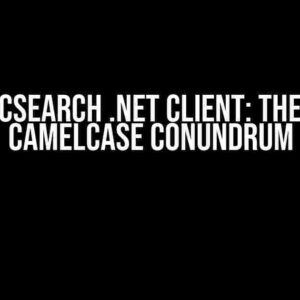Have you ever encountered this error message while trying to iterate over a collection of PropertyInfo objects in C#: “Foreach can’t be used for variables of type ‘PropertyInfo’ because ‘PropertyInfo’ has no definition for ‘GetEnumerator'”? Don’t worry, you’re not alone! In this comprehensive guide, we’ll explore what’s causing this error, why it happens, and most importantly, how to overcome it.
What is PropertyInfo?
Before we dive into the solution, let’s quickly review what PropertyInfo is and why it’s essential in C#. PropertyInfo represents a property of a class, and it provides information about that property, such as its name, data type, and attributes. You can think of it as a metadata container for properties.
public class Person
{
public string Name { get; set; }
public int Age { get; set; }
}
// Get PropertyInfo for the Name property
PropertyInfo nameProperty = typeof(Person).GetProperty("Name");
Why Can’t We Use Foreach with PropertyInfo?
The reason we can’t use a foreach loop directly with PropertyInfo is that it doesn’t implement the IEnumerable or IEnumerable
public interface IEnumerable
{
IEnumerator GetEnumerator();
}
public interface IEnumerable<out T>
{
IEnumerator<T> GetEnumerator();
}
Since PropertyInfo doesn’t implement these interfaces, we can’t use foreach with it. But don’t worry, there are workarounds!
Workaround 1: Using GetProperties() Method
One way to iterate over PropertyInfo objects is to use the GetProperties() method, which returns an array of PropertyInfo objects. We can then use a foreach loop with this array:
typeof(Person).GetProperties().ToList().ForEach(property =>
{
Console.WriteLine(property.Name);
});
Workaround 2: Using LINQ’s Select() Method
Another approach is to use LINQ’s Select() method, which allows us to project the PropertyInfo objects into an IEnumerable
var properties = typeof(Person).GetProperties().Select(p => p);
foreach (var property in properties)
{
Console.WriteLine(property.Name);
}
Workaround 3: Using a Regular for Loop
If you’re not comfortable with LINQ or the GetProperties() method, you can always fall back to a good ol’ fashioned for loop:
PropertyInfo[] properties = typeof(Person).GetProperties();
for (int i = 0; i < properties.Length; i++)
{
Console.WriteLine(properties[i].Name);
}
Real-World Scenarios: When to Use Each Workaround
In this section, we’ll explore real-world scenarios where each workaround is more suitable.
Scenario 1: Filtering Properties
Suppose you want to filter properties based on certain criteria, such as only selecting properties with a specific attribute. In this case, using LINQ’s Select() method is ideal:
var properties = typeof(Person).GetProperties()
.Where(p => p.GetCustomAttribute<MyAttribute>() != null);
foreach (var property in properties)
{
Console.WriteLine(property.Name);
}
Scenario 2: Performance-Critical Code
In performance-critical code, using the GetProperties() method and a regular for loop might be a better option, as it avoids the overhead of LINQ:
PropertyInfo[] properties = typeof(Person).GetProperties();
for (int i = 0; i < properties.Length; i++)
{
Console.WriteLine(properties[i].Name);
}
Scenario 3: Simple Iteration
In simple cases where you just need to iterate over the PropertyInfo objects, using the GetProperties() method with a foreach loop is a concise and readable solution:
typeof(Person).GetProperties().ToList().ForEach(property =>
{
Console.WriteLine(property.Name);
});
| Workaround | Scenario | Pros | Cons |
|---|---|---|---|
| GetProperties() | Concise, readable code | Limited flexibility | |
| LINQ’s Select() | Filtering properties | Flexible, powerful filtering capabilities | Performance overhead |
| Regular for Loop | Performance-critical code | Best performance, low overhead | Verbose code, less readable |
Conclusion
In conclusion, while PropertyInfo doesn’t implement the IEnumerable or IEnumerable
- GetProperties() method with a foreach loop: Simple iteration, concise code.
- LINQ’s Select() method: Flexible filtering capabilities, performance overhead.
- Regular for loop: Best performance, low overhead, verbose code.
Remember, the key to overcoming the “Foreach can’t be used for variables of type ‘PropertyInfo'” error is to understand the underlying reason and choose the appropriate workaround based on your specific requirements.
Here are 5 questions and answers about the error “Foreach can’t be used for variables of type PropertyInfo because PropertyInfo has no definition for GetEnumerator”:
Frequently Asked Question
Need help with PropertyInfo and GetEnumerator? We’ve got you covered! Check out these frequently asked questions to get back on track.
Why can’t I use a foreach loop with PropertyInfo?
You can’t use a foreach loop with PropertyInfo because PropertyInfo doesn’t implement the IEnumerable interface, which is required for foreach loops to work. Specifically, PropertyInfo is missing the GetEnumerator method.
What is GetEnumerator and why do I need it?
GetEnumerator is a method that returns an enumerator, which is an object that enables iteration over a collection. To use a foreach loop, the collection must have a GetEnumerator method that returns an enumerator. In the case of PropertyInfo, it doesn’t have GetEnumerator, so you can’t use a foreach loop directly.
How can I iterate over PropertyInfo objects if I can’t use foreach?
One way to iterate over PropertyInfo objects is to use a for loop instead of a foreach loop. You can also use LINQ’s `Cast` method to convert the collection to an enumerable collection, which can then be iterated over using a foreach loop.
Is PropertyInfo a collection?
No, PropertyInfo is not a collection. It represents a single property of a class, and it doesn’t contain multiple values that can be iterated over.
Can I use a different approach to work with PropertyInfo?
Yes, there are alternative approaches to working with PropertyInfo. For example, you can use reflection to get the property values, or you can use a library like PropertyInfoExtensions to simplify working with PropertyInfo objects.


